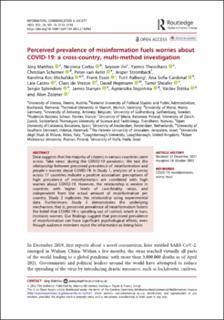| dc.contributor.author | Matthes, Jörg | |
| dc.contributor.author | Corbu, Nicoleta | |
| dc.contributor.author | Jin, Soyeon | |
| dc.contributor.author | Theocharis, Yannis | |
| dc.contributor.author | Schemer, Christian | |
| dc.contributor.author | van Aelst, Peter | |
| dc.contributor.author | Strömbäck, Jesper | |
| dc.contributor.author | Koc-Michalska, Karolina | |
| dc.contributor.author | Esser, Frank | |
| dc.contributor.author | Aalberg, Toril | |
| dc.contributor.author | Cardenal, Ana S | |
| dc.contributor.author | Castro, Laia | |
| dc.contributor.author | de Vreese, Claes | |
| dc.contributor.author | Hopmann, David Nicolas | |
| dc.contributor.author | Sheafer, Tamir | |
| dc.contributor.author | Splendore, Sergio | |
| dc.contributor.author | Stanyer, James | |
| dc.contributor.author | Stępińska, Agnieszka | |
| dc.contributor.author | Štětka, Václav | |
| dc.contributor.author | Zoizner, Alon | |
| dc.date.accessioned | 2024-04-16T10:26:03Z | |
| dc.date.available | 2024-04-16T10:26:03Z | |
| dc.date.created | 2022-12-06T09:33:02Z | |
| dc.date.issued | 2022 | |
| dc.identifier.citation | Information, Communication & Society. 2022, 26 (16), 3133-3156. | en_US |
| dc.identifier.issn | 1369-118X | |
| dc.identifier.uri | https://hdl.handle.net/11250/3126757 | |
| dc.description.abstract | Data suggests that the majority of citizens in various countries came across ‘fake news’ during the COVID-19 pandemic. We test the relationship between perceived prevalence of misinformation and people’s worries about COVID-19. In Study 1, analyses of a survey across 17 countries indicate a positive association: perceptions of high prevalence of misinformation are correlated with high worries about COVID-19. However, the relationship is weaker in countries with higher levels of case-fatality ratios, and independent from the actual amount of misinformation per country. Study 2 replicates the relationship using experimental data. Furthermore, Study 2 demonstrates the underlying mechanism, that is, perceived prevalence of misinformation fosters the belief that COVID-19 is spiralling out of control, which in turn, increases worries. Our findings suggest that perceived prevalence of misinformation can have significant psychological effects, even though audience members reject the information as being false. | en_US |
| dc.language.iso | eng | en_US |
| dc.publisher | Taylor & Francis | en_US |
| dc.rights | Attribution-NonCommercial-NoDerivatives 4.0 Internasjonal | * |
| dc.rights.uri | http://creativecommons.org/licenses/by-nc-nd/4.0/deed.no | * |
| dc.title | Perceived prevalence of misinformation fuels worries about COVID-19: a cross-country, multi-method investigation | en_US |
| dc.title.alternative | Perceived prevalence of misinformation fuels worries about COVID-19: a cross-country, multi-method investigation | en_US |
| dc.type | Journal article | en_US |
| dc.type | Peer reviewed | en_US |
| dc.description.version | publishedVersion | en_US |
| dc.source.pagenumber | 3133-3156 | en_US |
| dc.source.volume | 26 | en_US |
| dc.source.journal | Information, Communication & Society | en_US |
| dc.source.issue | 16 | en_US |
| dc.identifier.doi | 10.1080/1369118X.2022.2146983 | |
| dc.identifier.cristin | 2089228 | |
| cristin.ispublished | true | |
| cristin.fulltext | original | |
| cristin.qualitycode | 2 | |

